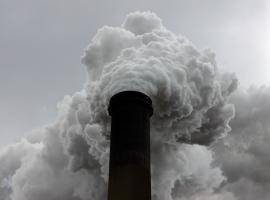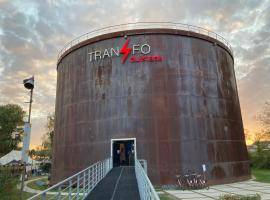Renewable Energy SOlutions for URban communities based on Circular Economy policies and Dc backbones – RE/SOURCED - aimed to create a DC Smart Grid, that incorporated both electricity generation and storage technologies while using Circular Economy principles, at a former coal fired power station site (TRANSFO) in Zwevegem, Flanders (BE). It was led by Leiedal Intermunicipal Association and brought together academic, research, business and municipal organisations.
While focused on creating the Smart Grid, the implementation recognised the sensitive heritage nature of the site and its growing role as a public amenity destination. The Educational attributes were central to the project’s overall delivery as was the creation of an Energy Community for businesses and residential premises located within the project’s boundary. Private and social housing was included in the wider regeneration of the area.
The project was technically complex. However, the main challenges related to regulation. Electricity generation is a highly regulated activity, with safety and reliability at its core. Therefore Regulators and Distribution System Operators (DSOs) are cautious when innovating. RE/SOURCED would create a DC Smart Grid (to maximise efficiency gains with Renewable Energy) which was highly novel as public grids operate on AC. As local renewable energy generation grows, so too will the relevance and learning of DC systems created by this project. It is ahead of its time.
When the project was first conceived, Flanders had created a Regulatory Sandbox designed to allow novel approached to be tested which RE/SOURCED proposed to use. However, implementation of the Sandbox was slow and only a small number of projects were accepted. Given its novelty and the Sandbox limitations, RE/SOURCED progress effectively stalled for a period. It was impossible to build a consensus with the Energy Regulator, Energy Agency and the DSO on an acceptable path forward – each organisation proposed its own solution, but none of these were acceptable to the others. The project sought guidance through an Interpretative Question to DG Energy.
In parallel, the Flanders Government was adopting the two key EU Energy Directives that should have supported energy sharing and citizen engagement. However, when the adoption in the national law was finalised relatively late in the project's delivery, energy sharing between individuals was not supported in a way that would allow RE/SOURCED Energy Community to operate sustainably. Creating an asset that the community could manage was a core goal of the project and the way Flanders adopted the EU Directives meant that a bespoke Energy Community would not be operationally/commercially viable.
Thus, the project had to compromise on some of its initial aspirations. It encountered challenges that were both legislative and technical (as well as dealing with the effects of the global COVID-19 Pandemic) but managed to find suitable adaptations and solutions. It created a Renewable Energy Circular Smart Grid and developed deep learning of how to deliver a project of this kind. Key aspects of this learning is shared below.




















